

Tekniikkajaetiikka. Tietotekninen tutkimus ja tutkimusetiikka - ratkaisematon haaste eettisille toimikunnille. Etiikan ohjeet. Tietotekniikan liitto OHJE versio 3.0 Etiikan työryhmä 20.12.2002 Tietotekniikan ammattilaisen etiikan ohjeisto Tietotekniikan liiton (nyk.
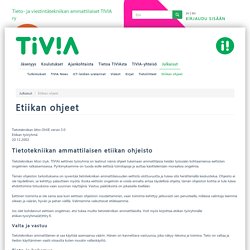
TIVIA) eettinen työryhmä on laatinut nämä ohjeet tukemaan ammattilaisia heidän työssään kohtaamiensa eettisten ongelmien ratkaisemisessa. Pyrkimyksemme on tuoda esille eettisiä toimitapoja ja auttaa käsittelemään moraalisia ongelmia. Tämän ohjeiston tarkoituksena on syventää tietotekniikan ammattilaisuuden eettistä ulottuvuutta ja tukea sitä herättämällä keskustelua.
Eettinen toiminta ei ole sama asia kuin eettisen ohjeiston noudattaminen, vaan toiminta kehittyy jatkuvasti sen perusteella, millaisia valintoja teemme oikean ja väärän, hyvän ja pahan välillä. Jos olet kohdannut eettisen ongelman, etsi tukea muilta tietotekniikan ammattilaisilta. Valta ja vastuu Tietotekniikan ammattilainen ei saa käyttää asemaansa väärin. Tieto ja kokemus Ammattilaisen on tunnettava rajansa: tiedettävä mitä osaa ja myös mitä ei osaa. Asenne. 20160360. 10. Oivioi. 902041. Etica e Politica, rivista di Filosofia On-Line. ABOUT ACM PUBLICATIONS. ACM publications bring the discoveries of computing researchers and practitioners to the world’s attention For more than 60 years, the best and brightest minds in computing have come to ACM to meet, share ideas, publish their work and change the world.
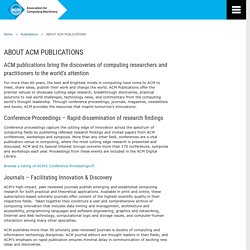
ACM Publications offer the premier venues to showcase cutting edge research, breakthrough discoveries, practical solutions to real world challenges, technology news, and commentary from the computing world’s thought leadership. Intellect Ltd. Principal Editor Associate Editors.
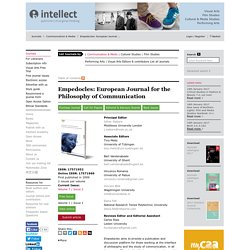
Annual Review of Information Science and Technology (ARIST) Minds and Machines. Journal of Trust Management - Springer. The Journal of Trust Management is a fully open access journal published under the brand SpringerOpen.
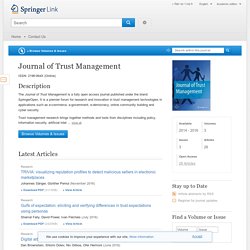
Education and Information Technologies. This is the official journal of the IFIP Technical Committee on Education.
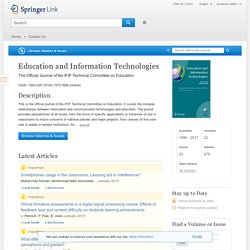
It covers the complex relationships between information and communication technologies and education. The journal provides perspectives at all levels, from the micro of specific applications or instances of use in classrooms to macro concerns of national policies and major projects; from classes of five year olds to adults in tertiary institutions; from teachers and administrators, to researchers and designers; from institutions to open, distance and lifelong learning.
This breadth of coverage allows Education and Information Technologies to examine fundamental issues at all levels, discuss specific instances and cases, draw inference and probe theory. This journal is embedded in the research and practice of professionals. hide. Universal Access in the Information Society - Springer. This journal addresses the accessibility, usability, and, ultimately, acceptability of Information Society Technologies by anyone, anywhere, at anytime, and through any media and device.
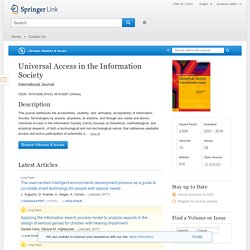
Universal Access in the Information Society (UAIS) focuses on theoretical, methodological, and empirical research, of both a technological and non-technological nature, that addresses equitable access and active participation of potentially all citizens in the information society. It features papers that report on theories, methods, tools, empirical results, reviews, case studies, and best-practice examples. The Journal's primary objectives are to: Human-centric Computing and Information Sciences - Springer. Human-centric Computing and Information Sciences is a peer-reviewed open access journal published under the brand SpringerOpen.
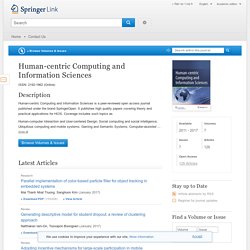
It publishes high quality papers covering theory and practical applications for HCIS. Coverage includes such topics as. Knowledge, Technology & Policy - Springer. Philosophy & Technology - Springer. Addresses the expanding scope and unprecedented impact of technologies, in order to improve the critical understanding of the conceptual nature and practical consequences, and hence provide the conceptual foundations for their fruitful and sustainable developments.
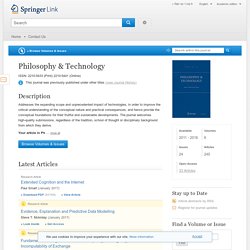
The journal welcomes high-quality submissions, regardless of the tradition, school of thought or disciplinary background from which they derive. Your article in Philosophy & Technology? Submit your article online via: All submissions are subjected to double-blind peer review; the average peer review time is 3 months.Authors wishing to submit a reply article, or a proposal for a review article, a book symposium, a special issue or a focused debate, are invited to contact the Assistant Editor for further information. Identity in the Information Society. Ethics and Information Technology - All Volumes & Issues - Springer. Ethics and Information Technology is a peer-reviewed journal dedicated to advancing the dialogue between moral philosophy and the field of information and communication technology (ICT).
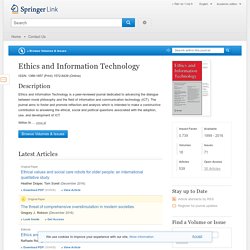
The journal aims to foster and promote reflection and analysis which is intended to make a constructive contribution to answering the ethical, social and political questions associated with the adoption, use, and development of ICT. Within the scope of the journal are also conceptual analysis and discussion of ethical ICT issues which arise in the context of technology assessment, cultural studies, public policy analysis and public administration, cognitive science, social and anthropological studies in technology, mass-communication, and legal studies. In addition, the journal features research that deals with the history of ideas and provides intellectual resources for moral and political reflection on ICT. An Error Occurred Setting Your User Cookie. The Modern History of Computing (Stanford Encyclopedia of Philosophy) Babbage Charles Babbage was Lucasian Professor of Mathematics at Cambridge University from 1828 to 1839 (a post formerly held by Isaac Newton).
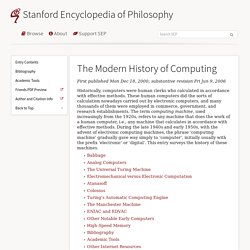
Babbage's proposed Difference Engine was a special-purpose digital computing machine for the automatic production of mathematical tables (such as logarithm tables, tide tables, and astronomical tables). The Difference Engine consisted entirely of mechanical components — brass gear wheels, rods, ratchets, pinions, etc. Numbers were represented in the decimal system by the positions of 10-toothed metal wheels mounted in columns. Babbage exhibited a small working model in 1822. The Swedes Georg and Edvard Scheutz (father and son) constructed a modified version of Babbage's Difference Engine. Babbage's proposed Analytical Engine, considerably more ambitious than the Difference Engine, was to have been a general-purpose mechanical digital computer. Analog computers The earliest computing machines in wide use were not digital but analog. Atanasoff F.H. Turing Machines (Stanford Encyclopedia of Philosophy)
1. A Definition of Turing Machines A Turing machine is a kind of state machine. At any time the machine is in any one of a finite number of states. Instructions for a Turing machine consist in specified conditions under which the machine will transition between one state and another. Cellular Automata (Stanford Encyclopedia of Philosophy) 1. Introduction 1.1 Getting Started: A Very Simple CA We introduce the basic ingredients of CA using a simple example. Think of an automaton as a one-dimensional grid of simple atomic elements (the cells), each of which can only instantiate one of two states; let us say that each cell can be turned on or off.
The global evolution of the system is determined by a transition rule, to be thought of as implemented in each cell. Fig. 1. Automated Reasoning (Stanford Encyclopedia of Philosophy) 1. Introduction A problem being presented to an automated reasoning program consists of two main items, namely a statement expressing the particular question being asked called the problem's conclusion, and a collection of statements expressing all the relevant information available to the program—the problem's assumptions. Solving a problem means proving the conclusion from the given assumptions by the systematic application of rules of deduction embedded within the reasoning program. The problem solving process ends when one such proof is found, when the program is able to detect the non-existence of a proof, or when it simply runs out of resources. 1.1 Problem Domain A first important consideration in the design of an automated reasoning program is to delineate the class of problems that the program will be required to solve—the problem domain.
The program was then used to show that a characterization of Boolean algebra that uses Huntington's equation, −(−x + y) + −(−x + −y) = x, 2. Relevance Logic (Stanford Encyclopedia of Philosophy) 1. Semantics for Relevant Implication Our exposition of relevant logic is backwards to most found in the literature We will begin, rather than end, with the semantics, since most philosophers at present are semantically inclined. The semantics that I present here is the ternary relation semantics due to Richard Routley and Robert K. Meyer. This semantics is a development of Alasdair Urquhart's “semilattice semantics” (Urquhart 1972).
The idea behind the ternary relation semantics is rather simple. Brey Soraker 2009 Phil IT. Williams Edge. Phenomenological Approaches to Ethics and Information Technology (Stanford Encyclopedia of Philosophy) 1. Views on the Nature of Information Technology It seems obvious that a world with information technology is somehow different from a world without information technology. But what is the difference? Is it a difference of degree (faster, closer, clearer, etc.) or is it a difference of kind? Does technology shape society or society shape technology, or both shape each other? The answers to these questions are also grounded to a large extent in one's particular, implicit or explicit, ontology of information technology itself; what is the nature—way of being—of information technology as such? 1.1 Information Technology as an Artifact or Tool The most common view of information technology is that it is an artifact or tool simply available, to use of not to use, in order for humans to achieve their objectives and outcomes. 1.2 Information Technology as Socially Constructed Artifacts and Actors.
Philosophy of Technology (Stanford Encyclopedia of Philosophy) 1. Historical Developments 1.1.
Informaatio ja etiikka. Informaatio, ontologia, metafysiikka. Informaatio, epistemologia, tieteenteoria. Informaation määrittely. International Association for Computing And Philosophy. TEDxMaastricht - Luciano Floridi - "The fourth technological revolution" Luciano Floridi - Why Philosophy of Information Matters. Keith Devlin on Information (Mini Symposium Philosophy of Information) Philosophy of Information. Information > Open Problems in the Study of Information and Computation (Stanford Encyclopedia of Philosophy) Information (Stanford Encyclopedia of Philosophy) 1. Information in colloquial speech. The 20blackwell 20guide 20to 20the 20philosophy 20of 20computing 20and 20information luciano 20floridi 20blackwell 202004 20376s.
Fld. i2pi 2013.